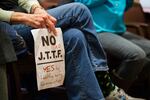The Portland City Council heard from police representatives Wednesday about the city’s 2020 involvement with the FBI’s joint terrorism task force.
City police shared a report that was mandated as part of a 2019 resolution withdrawing Portland from the task force over concerns that it had committed civil rights violations, had insufficient civilian oversight, and could be used to unjustly target Muslims and communities of color during the Trump administration.
The report’s release comes at a time when federal law enforcement has said it wants to focus more on domestic terror threats, particularly in the aftermath of the Jan. 6 assault on the U.S. Capitol.
According to the police department’s report, the Federal Bureau of Investigation requested Portland Police Bureau assistance on six cases in 2020. The federal agency referred four cases to Portland police for investigation and city police bureau referred six cases to the FBI. The small number of cases referred back and forth last year continued a downward trend from the previous two years, when those numbers were substantially higher.

A protester holds a sign opposed to Portland's involvement in the FBI-led joint terrorism task force at a City Council meeting Wednesday, Feb. 13, 2019, in Portland, Ore. The city has since left the task force, and Portland police report annually on any interactions they have with it.
Bradley W. Parks / OPB
“One of the good things that did happen in 2020, probably as a result of COVID-19, is that there was a significant drop in domestic and foreign terror attacks in the United States,” said Portland police Sgt. Pete Simpson, who said that decline may be related to fewer crowds. “We know that the country ... will reopen, we will have crowds again. The political violence has continued through 2020 and into 2021, as we saw at the state capitols and the U.S. Capitol.”
Cases referred to the Portland Police Bureau in 2020 included a man “affiliated with an anarchist extremist group targeting a person affiliated with a racially motivated violent extremist group for potential violence,” according to the report.
The FBI task force also referred a case that involved a man expressing racist, extremist violent ideology online and trying to acquire rifle parts, another involved a man trying to manufacture tear gas, and in a third incident the agency relayed information on an assault downtown during a protest.
Only the assault investigation led to an arrest.
In all six cases Portland police referred to the FBI, all the suspects were white males. The cases included threats against public officials, threats of targeted violence and a bomb threat.
Simpson cautioned that the federal government has put a new emphasis on domestic terrorism and violent extremism, and that the 2020 slowdown may reverse in 2021.
Simpson, Police Chief Chuck Lovell and Assistant Chief Mike Leisure fielded a brief round of questions Wednesday from Commissioner Jo Ann Hardesty, the only commissioner to ask questions about the report.
Hardesty said that, while mass shootings have dropped, there’s been a huge uptick in racially motivated violence. She asked why the report doesn’t reflect the increase in “white supremacist terrorism” that has taken place in the city.
Simpson explained that cooperation under the joint terrorism task force is only one way that local and federal law enforcement work together. Racist violence, for example, is typically investigated by the police bureau’s bias crimes detectives, who work with the FBI’s civil rights investigators when necessary.
“Where they might bleed over into our work is affiliation with a larger group,” Simpson said. “We don’t police ideology. Where we do step into the room is when we see ideology start to be paired with plans for violence or threats of violence.”
Terrorism, by definition, is a political action, making it a legal minefield for the justice system and ripe for abuse by law enforcement with a historic tendency to tolerate right-wing extremism. Dan Handelman, who runs the watchdog group Portland Copwatch, said the word “terrorism” itself is often abused.
“Certainly white supremacy is a big threat,” Handelman said. “But labeling something terrorism is an easy way to raise public hackles about it. It tends to snap back and to always come back to immigrants, people of color, people based on their religion, and progressive activists. Even when they’re focusing on white supremacy for a little while, that’s not the primary historical way the FBI has tracked political activism.”
And while it may have been the Trump administration that pushed Portland to ultimately leave the joint terrorism task force, Handleman said the FBI’s problematic history stretches back for years.
“It’s not just who’s the president or who’s in charge of the FBI or the Department of Justice,” he said, pointing to Japanese internment during WWII as an example. “It’s that the FBI has an institutional history of disrupting these vulnerable populations.”
